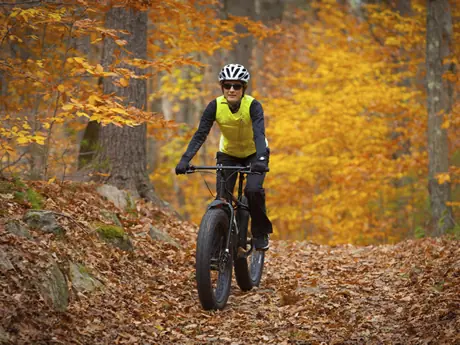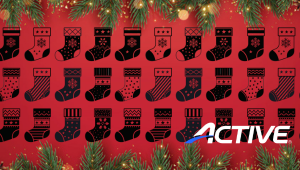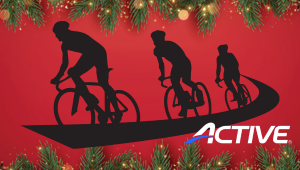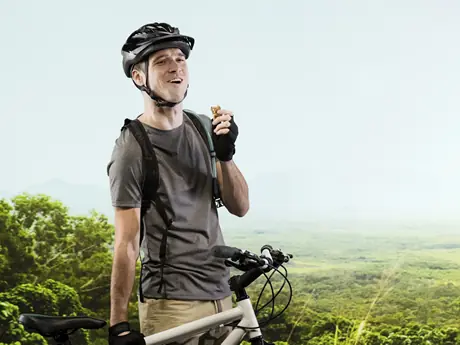
Welcome to the dreaded offseason. As cyclists, we are now at that point in our training hiatus where the sigh of relief, which follows a tough season of long miles has been replaced by a type of sedentary anxiety, cabin fever, or a case of the stir crazies. Call it what you want, but I'm down right restless.
As of now, I'm a couple months away from starting any type of regimented training and yeah I'll admit it, I've already packed on a few extra pounds.
If you're rolling your eyes thinking oh great, another cyclist talking about how to stay fit in the offseason, well you're partially right. This is that article but it's much more than that. It's about denouncing the offseason for everything it represents. How about we pack on a few extra pounds? But instead of stuffing our faces we get fat in a different way?
More: 8 Tips to Lose Weight From Cycling
Like I said, I've gained a little weight. Last week I gained 34 pounds, instantaneously. I recently bought a fatbike. Being a Midwesterner, I'm no stranger to snow, but that doesn't mean I enjoy it. Actually I despise it. I'm a prisoner in a freezing habitat. I'm bound by bars of ice and inches upon inches of crusty dirty snow, snow that just doesn't take a hint.
As soon as the first snowflake floats to the ground I typically dive head long into an offseason depression that plagues so many cold climate athletes. Am I a drama queen? Perhaps, but when you can only train in places known as "the pain cave," "the sweat cellar" or the "dungeon of hurt" you tend to get weepy come Halloween.
So if there's an option to stay outside and play or fall victim to another winter spent in my basement, I choose nature, EMPHATICALLY!
More: Review: Specialized Fatboy Pro
Tobie DePauw, owner manager of North Central Cyclery in Dekalb, Illinois put it best when he said, "I think the primary benefit is mental. You're still outside, you're still sweating, and you're having fun. It's an awesome workout, too. You have to stop thinking in distance and start thinking in time or calories because sometimes you're out there for a long time working hard and you'd don't get very far."
So, I'll say it again let the icy grip of winter take hold. I've got 4.5 inches of rubber between my legs (let those dirty thoughts go) and I can't wait to lay some tracks.
Still, what drives me bananas this time of year is the constant stream of Facebook updates, twitter feeds and Instagram pics from my west coast friends during the five months of crap-tacular weather we have here in the heartland.
So with the addition of my fatty to my bike stable, I'm hopeful that this year will be different. I will not be held hostage to the wrath of Old Man Winter any longer. My fatty will take me places even my 29er can't go.
More: 10 Weight Loss Tips From the Pros
"The best part of riding a fatbike is the sheer joy of it," DePauw said. "It's fun. There's an exhilarating liberty that comes with riding successfully through snow and sand and mud and cold. You feel like you are getting away with something."
This is so true. There's something about being on a fatty that makes you want to ride over things, trail blaze, and explore. It's the Humvee of the bike world. Owning a fatbike isn't something reserved for the eclectic or the bike weirdos. According to DePauw, the fat bike category was born out of necessity.
"At first glance, the attraction is just the freakshow nature of the bike. It's comical. Every notion of "efficiency", "light-weight", and "fast" goes out the window. I think that's why the early adopters were the older mountain bikers who were out for a good time and weren't counting grams," DePauw said. "Other early adopters were riders in the far north who had no other choice if they wanted to ride outside. That's where the category was really born."
As much as riding a fatty is pretty outside most athlete's repertoire, it's really not; it's still just a bike. The typical fatty rider likes a little competition too. So fear not cold climate cyclist, you mustn't hibernate your competitive drive any longer. In fact, the fat bike season is gearing up in frozen tundras world-wide. Simply browse the web for races nearby.
More: 16 Cool Cycling Tattoos
"As the category has been pushed and innovated, we've seen legitimate, all-season trail bikes come to market. Fatbikes are becoming legitimized by serious riders on all terrains, so it's started to take root with avid riders and not just the goofballs," DePauw said.
So we've covered cold weather cyclists need to get "fat" if they want to avoid the monotony of winter training. As long as all of your "honey-dos" have been checked off, this is a good time to start justifying to your significant other how important offseason conditioning is. Insert here: all the reasons why purchasing Another bike is of dire importance. Such as, being part of an international movement. Did you know Fatbike owners recently celebrated Global Fatbike day (Dec. 6th)? Riders posted pictures on social media by riding their fatties on trails, commuting to work and plowing through fresh powder.
Consult your local bike shop when you're ready to purchase your Fatbike and cold weather attire. Fatbikes come in all different shapes, sizes and material from carbon, titanium, steel and aluminum. There are full-suspension geared rides and full-ridged single speed whips. Fatbiking is sort of like an alternate universe for a triathlete gear junkie. Don't be fooled by the name Fatbike, fatty owners rank right up there on the "weight weenie" scale with roadies and triathletes. There are a number of Fatbikes that weigh in between 20 to 22 pounds.
Make a pledge this offseason to do something different. Add a little adventure to your training. Variety is the spice of life right? Make cold weather training fun weather training. Put the rubber to the snow and break new trail.
More: 10 Tips to Lose Weight Fast
 Ready to ride? Search for a cycling event.
Ready to ride? Search for a cycling event.





Discuss This Article